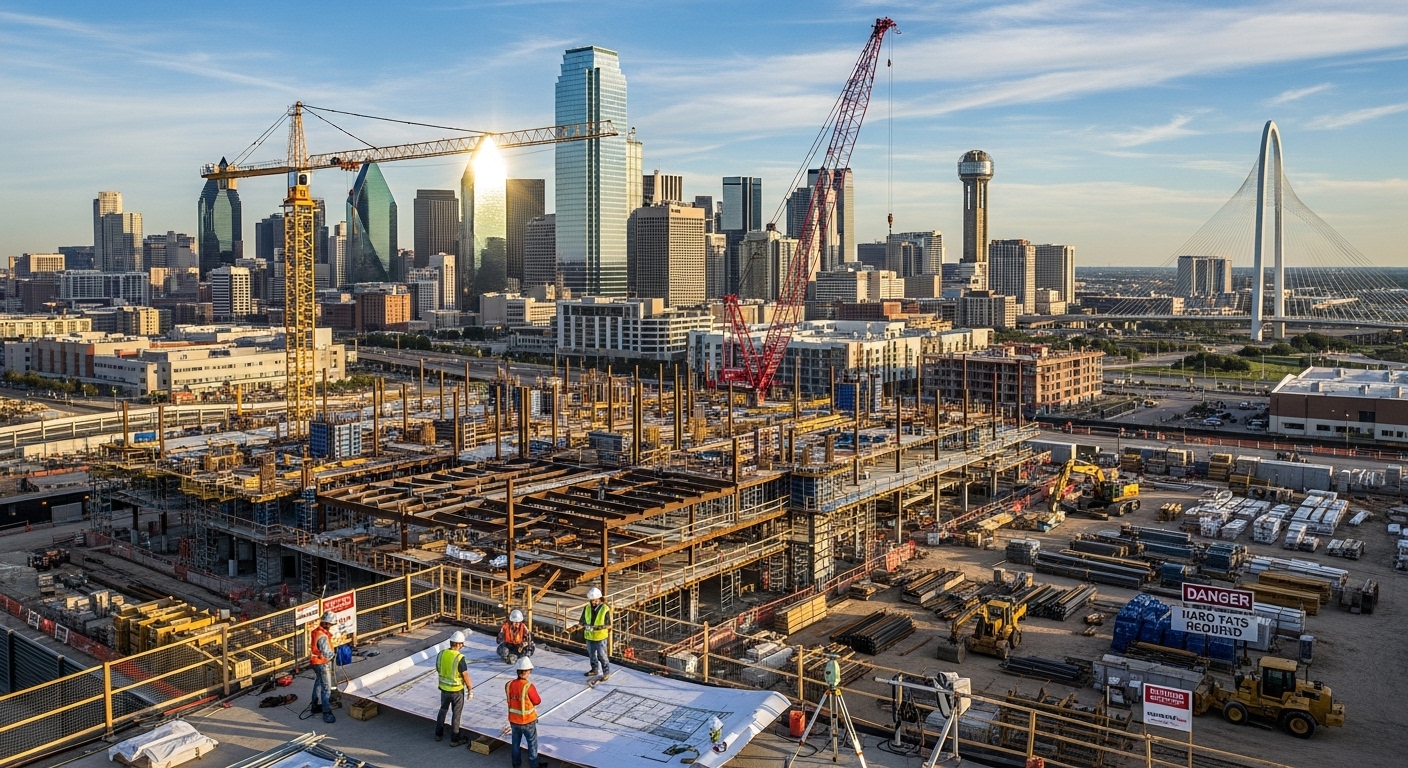I’ll create an SEO-optimized blog post targeting real estate developers in the Dallas area. Let me search for additional current information about Dallas construction trends to enhance the content.Now I’ll create a comprehensive SEO-optimized blog post targeting real estate developers in the Dallas area, incorporating the research data and information about Alder Designs.
Dallas Construction Market 2025: Strategic Opportunities for Real Estate Developers in North Texas
Dallas-Fort Worth has emerged as the undisputed leader in construction activity nationwide, with over 7.15 million square feet of new retail construction underway and industrial development exceeding 28 million square feet. For real estate developers seeking reliable construction partners in this booming market, understanding the current landscape and identifying strategic advantages has never been more critical.
Dallas Leads National Construction Growth in 2025
The Dallas-Fort Worth metroplex continues to outpace all other U.S. markets in construction activity, driven by unprecedented population growth and sustained economic expansion. Recent data shows the region capturing over 15% of the nation’s total retail construction activity, while industrial construction remains robust despite national slowdowns elsewhere.
Key Market Indicators for Real Estate Developers:
- Over 160,000 active construction projects statewide, with Dallas leading major developments
- $150 million law enforcement training center among September’s major bid opportunities in Dallas
- Population growth exceeding 8.4 million in the metropolitan area, fueling demand across all sectors
- Strong job market with projections of 225,000 new positions by 2025
This explosive growth presents both opportunities and challenges for developers who must navigate rising material costs, labor shortages, and increasingly complex project requirements.
Commercial Real Estate Construction Opportunities
Dallas has earned recognition as the country’s No. 1 commercial real estate market for 2025, attracting major corporate relocations and infrastructure investments. The commercial sector is experiencing robust activity across multiple segments:
Office and Mixed-Use Developments
The demand for modern office spaces continues strong, with emphasis on sustainable design and energy-efficient systems. Mixed-use developments combining retail, office, and residential components are becoming increasingly popular, offering developers diversified revenue streams and enhanced property values.
Industrial and Logistics Expansion
With Dallas-Fort Worth serving as a major logistics hub, industrial construction remains a priority sector. The region’s strategic location and transportation infrastructure make it ideal for distribution centers, manufacturing facilities, and advanced logistics operations.
Healthcare and Educational Facilities
Major investments in healthcare and educational infrastructure continue throughout the region, creating opportunities for specialized developers focused on institutional projects.
Rising Construction Costs: Strategic Challenges and Solutions
The construction boom comes with significant cost pressures. Nonresidential construction materials have experienced accelerated price increases, with steel, concrete, and electrical components seeing substantial escalation throughout Texas.
Smart developers are adapting through:
- Value engineering approaches that optimize design without compromising quality
- Strategic material procurement to lock in pricing ahead of project starts
- Partnerships with experienced construction management teams who understand cost control
- Energy-efficient upgrades that provide long-term operational savings
Residential Development Trends Shaping Dallas
The residential sector continues to capture market momentum, with new construction representing 29% of total closings in 2024. Consumer preferences are evolving toward specific features that developers must consider:
Smart Home Integration
According to recent market research, 63% of buyers now consider smart home capabilities highly important—a 29-percentage point increase since 2019. Developers incorporating smart thermostats, security systems, and automated features gain competitive advantages.
Energy Efficiency Focus
With Texas experiencing extreme summer temperatures and new heat protection standards being proposed, energy-efficient HVAC systems and weatherproofing have become critical selling points. These improvements can reduce operational costs by 20-30% while improving tenant satisfaction.
Pet-Friendly and Family-Oriented Features
Nearly 75% of new construction buyers have pets, making pet-friendly amenities essential. Kid-friendly features like community parks and playgrounds also add considerable appeal for family-oriented developments.
The Construction Partner Advantage in Complex Projects
Successful real estate development in Dallas’s competitive market requires more than just financial resources—it demands experienced construction partners who understand the unique challenges of operating in high-demand environments.
Expertise in Occupied Environments
Many development projects involve renovation or expansion of existing facilities while maintaining operational continuity. This requires specialized expertise in:
- Phased construction approaches that minimize disruption
- Clear communication protocols with tenants and stakeholders
- Safety and access management during construction phases
- Quality control systems that ensure standards are maintained
Veteran-Owned Construction Leadership
Military-trained construction professionals bring unique advantages to complex development projects. Companies like Alder Designs, a 100% veteran-owned construction firm based in Fort Worth, exemplify the discipline and precision that characterize successful project execution in competitive markets.
With over 70 years of combined construction expertise, veteran-owned firms often demonstrate:
- Mission-driven approaches with integrity and transparency
- Proven four-step processes: assessment, planning, execution, and delivery
- Military discipline applied to project management and quality control
- Clear communication and budget transparency throughout projects
Strategic Services for Real Estate Developers
Today’s successful developers leverage specialized construction services that go beyond traditional general contracting:
Third-Party Assessments and Evaluations
Property Condition Assessments (PCA) and Capital Needs Assessments (CNA) provide developers with data-driven insights for strategic planning. These independent evaluations identify:
- Priority improvements and compliance requirements
- Energy efficiency opportunities with measurable ROI
- Infrastructure needs that affect project feasibility
- Risk factors that could impact development timelines
Bid Reviews and Contractor Audits
In Dallas’s high-demand construction market, independent bid reviews and contractor payment audits protect developers from cost overruns while ensuring quality standards. Professional bid evaluation includes material cost verification, labor hour validation, and contractor qualification assessment.
Design-Build Integration
Developers increasingly benefit from design-build services that streamline project delivery while maintaining cost control. This approach reduces coordination challenges and accelerates project timelines in fast-moving markets.
Fort Worth’s Strategic Advantage for Dallas Developers
The proximity between Fort Worth and Dallas creates strategic opportunities for developers to access specialized construction expertise while maintaining cost efficiency. Fort Worth-based construction firms often provide competitive pricing while delivering the quality and reliability that Dallas developments demand.
Key advantages include:
- Reduced overhead costs compared to Dallas-based contractors
- Established supply chain relationships throughout North Texas
- Experience with both suburban and urban development challenges
- Access to skilled labor pools across the metroplex
Technology Integration and Digital Tools
Modern real estate development requires sophisticated project management and marketing tools. Industry leaders are leveraging:
Digital Project Management
Advanced construction firms now provide real-time project tracking, digital documentation, and enhanced communication tools that give developers visibility into renovation progress and budget status.
Virtual Marketing Solutions
Features such as 3D tours, interactive floor plans, and virtual staging have become essential for marketing new developments. Recent data shows 72% of buyers wish more listings offered 3D tours, up from 60% in 2020.
Building Information Modeling (BIM)
BIM technology streamlines project design, reduces construction errors, and improves collaboration between developers, architects, and construction teams.
Market Outlook and Strategic Positioning
The Dallas construction market’s continued expansion creates compelling opportunities for developers who position themselves strategically. Key success factors include:
Diversified Project Portfolios
Successful developers are balancing residential and commercial projects across multiple submarkets to minimize risk while maximizing growth opportunities.
Sustainability Focus
Environmental consciousness drives demand for green building certifications and energy-efficient systems. Developers investing in sustainable construction practices gain competitive advantages while reducing long-term operational costs.
Strategic Construction Partnerships
Long-term relationships with experienced construction partners provide consistent quality, preferential pricing, priority scheduling, and accumulated project knowledge that improves efficiency over time.
Capitalizing on Dallas’s Construction Boom
The Dallas-Fort Worth region’s position as the nation’s leading construction market creates exceptional opportunities for real estate developers who understand how to navigate its complexities. Success requires strategic partnerships with experienced construction professionals who can deliver quality results while maintaining operational continuity.
The construction surge transforming Dallas reflects broader economic fundamentals that position the region for continued growth. Developers who invest strategically in capital improvements while leveraging veteran-owned construction expertise will thrive in this dynamic market environment.
As Dallas continues to attract corporate relocations and population growth, the construction industry will remain a critical driver of regional development. Real estate developers who establish strong local partnerships and focus on quality execution will find themselves well-positioned to capitalize on the ongoing expansion throughout North Texas.
For developers seeking reliable construction partners with proven track records in complex project delivery, the Dallas-Fort Worth region offers access to industry-leading expertise capable of turning development visions into profitable realities.


0 Comments